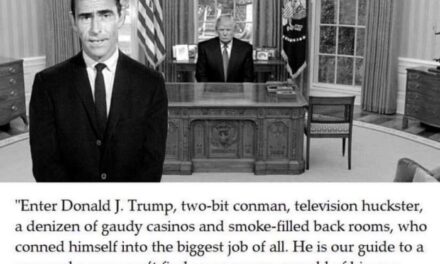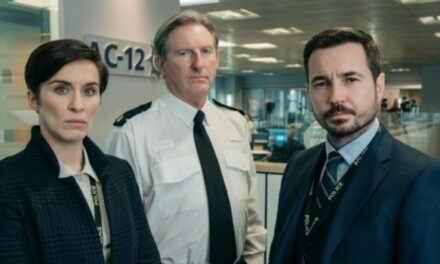I think when Alex [Gansa] and I first conceived the series, it seemed obvious that we couldn’t take the show with Brody as a character beyond the first season. But then we realized how rich that mine was and how much more there was left to get out of it. — Howard Gordon, co-creator of Homeland (Milzoff)
The first season of Homeland had so much going for it that by and large the audience overlooked the fact that the showrunner, Alex Gansa, and his co-creator, Howard Gordon, fudged the ending. The momentum of the principal narrative arc of those initial twelve episodes always led inexorably towards a domestic terrorist act that protagonist and CIA analyst Carrie Mathison (Claire Danes) had been obsessively trying to uncover and thwart ever since she set eyes on a video of her antagonist, US Marine sergeant, Nicholas Brody (Damian Lewis), being pulled bearded and filthy from a ‘spider hole’ à la Saddam Hussein by an elite Delta Force team. Mathison’s colleagues at the CIA congratulated themselves on facilitating Brody’s rescue from al-Qaeda after eight years in captivity. Carrie alone was skeptical as to why al-Qaeda would keep him alive after his usefulness had long ago expired.
On October 26, 2011, Showtime Entertainment President, David Nevins, publically announced that Homeland was being renewed for a second season. At that time, four episodes of season one had premiered while only eight total had been either completed or were in some stage of production. The question arose in the writers’ room whether or not to kill Brody off after all. Claire Danes was clearly the star of the series with Gansa and Gordon even naming their protagonist Claire with the actress in mind during the earliest drafts of the pilot script well before she was even approached to join the production. Damian Lewis’ Brody was moreover making a much stronger than expected impression on viewers, as his chemistry with Danes was an unmistakable factor in the series’ breakout success.
Carrie Mathison and Brody were linked by their obvious strengths and vulnerabilities from the very first episode. She is a savant of sorts with a special gift for espionage fueled by a genetic bipolar affective imbalance inherited from her father. By episode two, ‘Grace,’ Brody appeared on Carrie’s surveillance screens as her doppelgänger suffering from post-traumatic stress disorder, unable to resume a healthy sexual relationship with his wife Jessica (Morena Baccarin), and haunted by frequent nightmares and daytime hallucinations of Homeland’s al-Qaeda mastermind Abu Nazir (Navid Negahban). Carrie crosses the line and becomes emotionally and eventually sexually involved with Brody by episode six, ‘the Good Solider,’ enacting an unorthodox if plausible symbolic union of two damaged government service professionals searching for meaning and solace in the aftermath of 9/11.

As attractive as this pairing may be, one of the unwritten rules of cable-and-satellite television drama in the post-Sopranos era is to preserve the integrity of the fictional world to the point where it should always take precedence over the fate of any one character—no matter how popular or well realized. David Chase has admitted how he and his creative collaborators had written themselves into a corner and consequently had no other choice other than to kill off Salvatore ‘Big Pussy’ Bonpensiero (Vincent Pastore) at the end of season two of The Sopranos in order to stay true to the storyline (NPR). Big Pussy’s demise later opened up a floodgate of major characters getting whacked on the series whenever the narrative required that kind of denouement. Likewise, characters such as Jimmy Darmody (Michael Pitt) on Boardwalk Empire, Eddard Stark (Sean Bean) on Game of Thrones, and Mags Bennett (Margo Martindale) on Justified have all been recently sacrificed for the greater narrative good when the demands of their respective storylines warranted such bitter ends.
This brings me back to Brody on Homeland. This series is now suffering from the consequences of its creators making the short-term audience-friendly decision in the final episode of season one, ‘The Vest,’ of having Brody survive at the expense of the internal coherence of season one’s narrative arc. This trajectory is clearly presented in Homeland’s earliest trailer where Carrie’s discovery that ‘an American prisoner of war has turned’ propels inevitably forward to Brody jogging past the White House before finally stopping and staring defiantly at the Capitol. He clearly is troubled, angry, and up to no good.
Gansa and Gordon issuing the popular Brody a stay of execution is understandable if regrettable. Brody is prepared to make the ultimate sacrifice in order to dispense rough justice on Vice President, William Walden (Jamey Sheridan), who he believes to be a war criminal for ordering a series of drone attacks that have killed scores of innocent civilians including Abu Nazir’s son and Brody’s former charge, Issa. Having maneuvered close enough to Walden, the one main character in the series presented with no nuance whatsoever, Brody flips the switch on his suicide vest but is saved because of a wardrobe malfunction. Nicholas Brody survives, plus he doesn’t have to compromise his principles since he is ostensibly willing to follow through on his mission. Brody is even given more of an excuse when his daughter calls him at the behest of Carrie to ‘talk him down,’ while he is ensconced with the vice president and other high ranking government officials in a secure White House bunker. Ever the epitome of American arrogance, Walden spots Brody and flaunts his obliviousness by cavalierly telling him, ‘hey, you look like shit.’


It is hard to determine if Vice President Walden is meant to evoke anyone in particular. Two shots of President Obama appear in the opening title sequence, but Walden is ideologically and temperamentally unlike the current vice president, Joe Biden. Walden doesn’t resemble Dick Cheney either, despite their stubborn and domineering tendencies. Interestingly, every American president from Ronald Reagan to Barack Obama is visually and aurally referenced in Homeland’s opening title sequence, save one—George W. Bush. His absence in this regard is striking, given his centrality to our collective memory of September 11. Irrespective of intentionality, Bush most resembles Walden’s personal style—his swagger, cock-sureness, and sense of privilege and entitlement. President Bush is thus part of the fabric of Homeland, if not overtly represented.
Homeland’s brilliant opening title sequence (GO HERE TO WATCH) is meant to simulate one of Carrie Mathison’s fevered dreams. She is the series’ protagonist; viewers see the action first and foremost through her eyes. Her presence is Homeland’s essential ingredient which imbues the program with a deeper cultural resonance. The onscreen relationship that Carrie has with Brody is a combustible mix of shared psychological trauma emanating from the September 11 attacks and the hostilities that followed, but she is the audience’s one indispensable surrogate who is trying to manage her psychic turmoil while still ‘making sure we don’t get hit again.’ Carrie’s bipolar extremes mirror post-9/11 America’s collective response to the decade-old terrorist attacks. The core dramatic preoccupation of Homeland is therefore not a love story between Carrie and Brody. Falling back on such shopworn clichés only strains credulity and undermines what has made the series special up to this point.
Recently renewed for a third season, Homeland’s creative team confronts the same dilemma it faced a year ago. Once again the question of whether or not to bring Brody back is on the front burner. The temptation to further violate the internal coherence of Homeland’s narrative is now greater than ever with the program winning six Emmys including Best Actor in a Drama Series for Damian Lewis, along with Best Actress for Claire Danes and Best Drama Series. Despite this level of institutional success, consider what has gone on in season two because the logic of the narrative got turned upside down at the end of season one whereby the antagonist walks away scot-free while the protagonist suffers the consequences of voluntary ECT (electroconvulsive therapy) after being told by everyone she is crazy wrong about Brody even though she is lucidly right.

So far season two has contained a series of dubious plot twists, which are all designed to bring Carrie back into the CIA fold even though the aftereffects of her ECT have left her more damaged and vulnerable than ever. To cite just a few of an ever increasing number of improbabilities, Homeland now features Brody as a newly elected congressman who is almost immediately being considered as a serious vice presidential candidate. Early on he saves Abu Nazir from certain capture and maybe even death by texting him a warning (‘May1’) from a secure government location surrounded by the joint chiefs of staff. Brody additionally agrees to take on an errand from hell for Nazir where he picks up the tailor who made his suicide vest in Gettysburg, Pennsylvania, and eventually kills the paranoid and confused man after a series of unfortunate misunderstandings and mishaps. Meanwhile Brody’s teenage daughter, Dana, begins dating fellow classmate, Finn, who also happens to be Vice President Walden’s son. Needless to say, this budding romance is a convenient if obvious ploy to keep the two families closely connected on yet another dramatic level.
In addition, Saul stumbles upon Brody’s suicide video and this high profile congressman is suddenly abducted for days of interrogation by an outside group of CIA operatives including Carrie, while the Washington press corps hardly notices his absence. During questioning, Brody is also subject to the ‘bad cop/good cop’ routine where CIA analyst, Peter Quinn (Rupert Friend) drives a knife into the back of his left hand à la Luca Brasi in The Godfather. Carrie then swoops in and turns Brody’s allegiance yet again in record time, leaving him curled in the fetal position on the interrogation room floor. None of these improbable twists and turns deny the fact that the acting is usually first rate and the drama often compelling. The problem with Homeland is that as Brody tells one lie after another, he is left increasingly bewildered as to who he is and what he truly believes. In turn, his growing disorientation is an apt analogy of what has happened to the series’ narrative as a whole.
Nicholas Brody’s narrow escape from death in season one has left him under siege from all sides in season two: his wife Jessica no longer believes much of what he has to tell her; ex-Marine buddies Mike (Diego Klattenhoff) and Lauder (Marc Menchaca) are suspicious about his possible involvement in the shooting of Tom Walker (Chris Chalk) and hot on his trail; Walden too is pressuring him to play out his assigned role on the national stage; while Abu Nazir is closing in on him via journalist Roya Hammad (Zuleikha Robinson); and last but not least, he has become a CIA asset assigned to Carrie Mathison who is keeping close tabs on him even as she violates any reasonable professional code of conduct in her personal relationship with him.
No wonder Brody can’t tell whether he’s coming or going. Enough is already enough. Homeland’s creative team needs to trust that Claire Danes is more than capable of acquitting herself through a series of newly cast antagonists much in the same way that James Gandolfini did during the full run of The Sopranos. She obviously has the acting chops to carry a series. For his part, Damian Lewis is an outstanding performer who is a most deserving Emmy winner, but the entertainment world is filled with wonderful actors who can similarly achieve a special onscreen alchemy with Claire Danes. For the long-term narrative coherence and credibility of Homeland, Brody must die.
Gary R. Edgerton is Professor and Dean of the College of Communication at Butler University. His latest volumes are Westerns: The Essential Journal of Popular Film and Television Collection with Michael T. Marsden (Routledge, 2012) and Mad Men: Dream Come True TV (I.B. Tauris/Palgrave Macmillan, 2011), while The Sopranos is forthcoming in March 2013 from Wayne State University Press as part of its TV Milestones series. He also coedits the Journal of Popular Film and Television.





